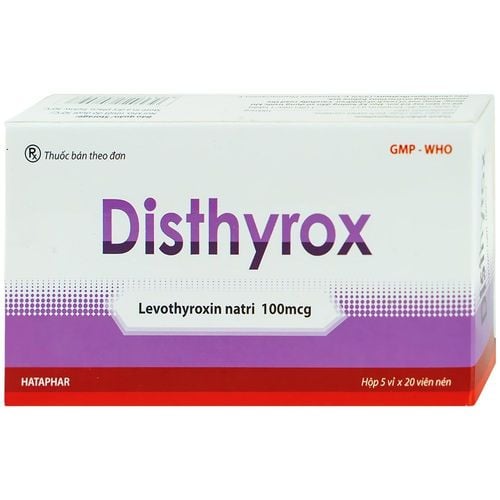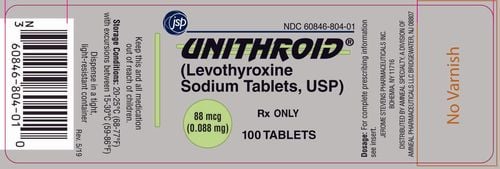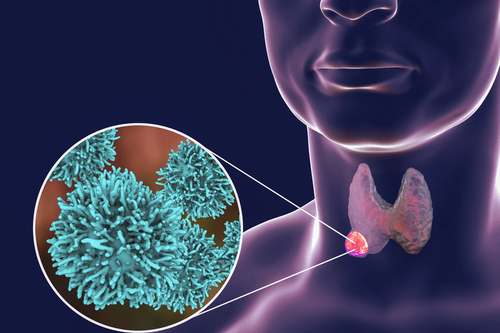This is an automatically translated article.
The article is written and medically reviewed by Dr. Izabella Wentz, Clinical Pharmacist, FASCP, January 23, 2019Article translated by Master, Doctor Nguyen Thi Hang – Pathology Unit – Laboratory Department – Vinmec Times City International General Hospital
As I was on my way to recovering from Hashimoto's, I invested countless hours in finding the right diet, experimenting with a variety of supplements, and tweaking my medication to feel better. And for a long time, the above really worked for me. I have more energy, my hair is starting to grow back, my reflux is gone and I feel more productive than ever. I even wrote my first book!
But there were times when I was extremely tired and cranky, despite taking my thyroid medication regularly and following a gluten/dairy-free diet. I remember seeing the effects of stress begin to affect my body, and thinking that all the diets and supplements in the world couldn't make up for the body's response to stress. constant stress.
That's when I realized I needed to slow down, say "no" a little more, and incorporate self-care into my daily life. If not, I risk going back to when I started... exhausted, tired and losing my hair!
The mindfulness practices that I started incorporating into my life have stayed with me to this day. I see them as an important piece of the puzzle that helps me manage stress and since then Hashimoto's disease has also been in remission.
1. Hashimoto's disease and stress
Looking back at the health histories of thousands of Hashimoto patients, I've found that the inability to manage stress is often at the heart of the condition.While numerous studies have shown that stress can trigger or worsen autoimmune diseases, because the timing of Hashimoto's onset and progression can be slow and difficult to determine, the impact of stress to the thyroid gland can be ignored.
Several human and animal studies have shown that both psychological and physiological stress affect the immune system through the nervous and endocrine systems. These immune changes contribute to the development of autoimmunity in people with a genetic predisposition.
When you experience stress, your body goes into “fight or flight” mode. It diverts attention away from healing and digestion, then releases adrenaline in preparation to survive what the body deems life-threatening.
Many people assume that a traumatic event in their life is a precursor to Hashimoto's symptoms. But chronic stressors can also play a role in autoimmune disease, which often comes from within, in the way we interpret and perceive the world. In talking with other thyroid patients, I've noticed that many of us share some of the same personality traits as fear of failure, perfectionism, negative self-talk, and being very hard on ourselves. Dear.
But the good news is that our bodies have an amazing ability to heal themselves. May help your body return to a “rest and digest” mode, where it is actively repairing and healing itself.

2. Solutions to reduce stress
If stress is an inherent part of our lives, it is how we handle it that really matters. There are many stress-reduction tools that I use in my daily life to help manage my stress levels, including mindfulness, yoga, journaling, and meditation.Studies have shown that mindfulness-based stress reduction activities – like yoga, breathing and meditation – have a positive effect on not only mood and cognition but also immunity.
Helpful practices to start incorporating into your daily life to reduce stress include:
Meditation : This helps increase focus, reduces fatigue and boosts hormones . Yoga: Gentle forms of Yoga, such as Yin Yoga and Hatha Yoga, have been shown to calm the central nervous system and relax the mind. Journaling: This can help you focus your thoughts and explore emotions that may be raising your stress levels. Massage and acupuncture: These therapies can reduce stress on a physiological level. Mindfulness: This means being in the present moment, observing your thoughts and feelings, and not “reacting” to them. Manifest : This means being an innovator for your own journey to your destination! I recently posted about “expression” on Instagram. 🙂 Every few years I create a vision board of what I want my life to look like... and many readers have commented on how they present their future! I agree!

If becoming healthier is part of what you want to achieve in life then I recommend implementing some of the stress reduction strategies above. While we can all have different causes and root causes, reducing stress helps all of them.
3. Benefits of Meditation for Thyroid Health
Meditation can be an especially powerful tool for improving thyroid health as studies have shown it has the ability to increase levels of important hormones and neurotransmitters, including serotonin. , the calming neurotransmitter GABA, the adrenal hormone DHEA, growth hormone, and melatonin.Research also shows that meditation can help your adrenal glands. We know that stress is a cause of adrenal fatigue, which can be exacerbated and, in some cases, cause hypothyroidism. Practicing meditation can reduce stress levels by significantly reducing elevated cortisol levels.
Other well-researched benefits of meditation include reduced inflammation, improved immunity, and reduced risk of heart disease, stroke, and even cancer.
With just 15 minutes of meditation a day, you have the power to lower your stress levels, support your thyroid, and boost your mental and physical health without even leaving the house!
3.1 The resource of meditation Meditation is something you can do on your own without a prescription (although many progressive doctors are now recommending it!). It's free! There are thousands of free “HOW” articles and videos you can find on meditation... But I know that a lot of people have a hard time starting and maintaining this beneficial habit.
One way to make meditation easier is to use the brain sensor Muse, a device that monitors your brain activity, heart rate, breathing rate and body movements during meditation. Wearing this tool like a headband, you will get real-time feedback on your brain activity, which will guide you through your meditation experience and keep you focused!

After years of teaching thousands of people through her advanced meditation courses in NYC, Emily has summarized the keys to her technique in her upcoming book “Reduce Stress, Accomplish More: Meditate for Extraordinary Performance”.
Here's what one client had to say about her book:
“As a clinical dietitian, I recommend all my patients to meditate, but I feel like a con. island because I can't do it myself. Before I met Emily, I tried to meditate many times but I couldn't 'clear my head'. The more I try to stop thinking, the more thoughts will come. I feel like a complete failure.
After meeting Emily and learning that thoughts are not the enemy, my relationship with meditation changed overnight! It has gone from what I dread to what I look forward to every day!
From a health perspective, I sleep deeper, worry less and feel more productive. The biggest thing that changed was my autoimmune condition. I have Hashimoto's and after two months of taking Ziva (no dietary changes or supplements), my Thyroid Peroxidase Antibody (antithyroid antibodies and the usual Hashimoto measure) has dropped 200 points! ” - Inna T.
In “Reduce Stress, Accomplish More”, you will not only learn how to practice every day, but also gain a smart understanding of how much stress is keeping you from performing. full motion. What are your favorite resources for meditation?
I look forward to hearing from you and how mindfulness and meditation have helped you on your stress-reduction and healing journey from Hashimoto's patients.
Please dial HOTLINE for more information or register for an appointment HERE. Download MyVinmec app to make appointments faster and to manage your bookings easily.
ReferencesMizokami T, Wu Li A, El-Kaissi S, Wall JR. Stress and thyroid autoimmunity. Thyroid . 2004 Dec;14(12):1047-55. Stojanovich L, Marisavljevich D. Stress as a trigger of autoimmune disease. Autoimmun Rev. 2008 Jan;7(3):209-13. doi: 10.1016/j.autrev.2007.11.007. Moynihan JA, Chapman BP, Klorman R, Krasner MS, Duberstein PR, Brown KW, Talbot NL. Mindfulness-based stress reduction for older adults: effects on executive function, frontal alpha asymmetry and immune function. Neuropsychobiology. 2013;68(1):34-43. doi: 10.1159/000350949. Rosenkranz MA, Davidson RJ, MacCoon DG, Sheridan JF, Kalin NH, Lutza A. A comparison of mindfulness-based stress reduction and an active control in modulation of neurogenic inflammation. ScienceDirect. 2013 Jan;27:174-184. doi.org/10.1016/j.bbi.2012.1013 Schneider RH, Grim CE, Rainforth MV, Kotchen T, Nidich SI, Gaylord-King C, et al. Stress Reduction in the Secondary Prevention of Cardiovascular Disease. Cardiovascular Quality and Outcomes . 2012;5:750–758














